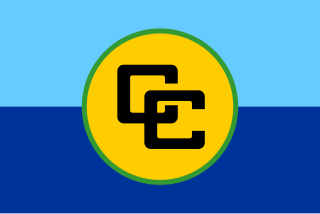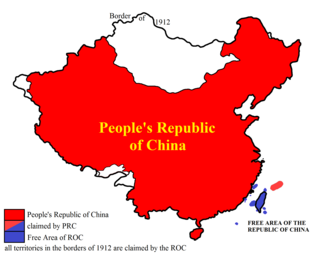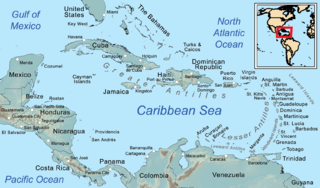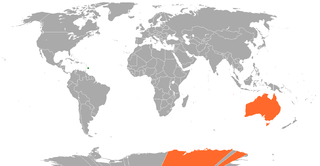
The foreign relations of the People's Republic of China (PRC), commonly known to most states as China, has full diplomatic relations with 179 out of the other 193 United Nations member states, Cook Islands, Niue and the State of Palestine. Since 2019, China has had the most diplomatic missions of any country in the world. This article guides the way in which China interacts with foreign nations and expresses its political and economic weaknesses and values. As a great power and an emerging superpower, China's foreign policy and strategic thinking are highly influential. China officially claims it "unswervingly pursues an independent foreign policy of peace". The fundamental goals of this policy are to preserve China's independence, sovereignty and territorial integrity, create a favorable international environment for China's reform and opening up and modernization of construction, and to maintain world peace and propel common development." An example of a foreign policy decision guided by "sovereignty and territorial integrity" is not engaging in diplomatic relations with any country that recognizes the Republic of China (Taiwan), which the PRC does not recognise as a separate nation.

Taiwan, officially the Republic of China (ROC), has full diplomatic relations with 13 out of 193 United Nations member states, as well as the Holy See. Historically, the ROC has required its diplomatic allies to recognise it as the sole legitimate government of "China", but since the 1990s, its policy has changed into actively seeking dual recognition with the People's Republic of China. In addition to these relations, the ROC also maintains unofficial relations with 58 UN member states, one self-declared state (Somaliland), three territories, and the European Union via its representative offices and consulates. Taiwan has the 31st largest diplomatic network in the world with 110 offices.

The Caribbean Community is an intergovernmental organisation of 15 member states throughout the Caribbean having primary objectives to promote economic integration and cooperation among its members, to ensure that the benefits of integration are equitably shared, and to coordinate foreign policy. The organisation was established in 1973. Its major activities involve coordinating economic policies and development planning; devising and instituting special projects for the less-developed countries within its jurisdiction; operating as a regional single market for many of its members ; and handling regional trade disputes. The secretariat headquarters is in Georgetown, Guyana. CARICOM is an official United Nations Observer beneficiary.

The Barbados national football team, nicknamed Bajan Tridents, is the national association football team of Barbados and is controlled by the Barbados Football Association. It has never qualified for a major international tournament. It came close to qualifying for the 2005 CONCACAF Gold Cup as it hosted the Caribbean Cup finals that acted as Gold Cup qualifiers, but finished fourth of the four teams. In 2001, it surprised many by making the semifinal round of the 2002 World Cup Qualifiers. In the first game of this round, they pulled off a shock 2–1 win over Costa Rica, but lost their five remaining games. In 2004, Barbados gained a shock 1–1 draw at home to Northern Ireland.

Since its founding in 1949, the People's Republic of China (PRC) has had a diplomatic tug-of-war with its rival in Taiwan, the Republic of China (ROC). Throughout the Cold War, both governments claimed to be the sole legitimate government of all China and allowed countries to recognize either one or the other. Until the 1970s, most Western countries recognized the ROC while the Eastern Bloc and Third World countries generally recognized the PRC. This gradually shifted and today only 13 UN member states recognize the ROC while the PRC is recognized by the United Nations, 180 UN member states and the State of Palestine as well as Cook Islands and Niue. Both the ROC and the PRC maintain the requirement of recognizing its view of the One-China policy to establish or maintain diplomatic relations.

In the United States government, the Bureau of Western Hemisphere Affairs (WHA) is a part of the U.S. Department of State, charged with implementing U.S. foreign policy and promoting U.S. interests in the Western Hemisphere, as well as advising the Under Secretary of State for Political Affairs. It is headed by the Assistant Secretary of State for Western Hemisphere Affairs, who is currently Brian A. Nichols.

The term "Two Chinas" refers to the current geopolitical situation of two political entities with the name "China":

The Caribbean Free Trade Association (CARIFTA) was organised on May 1, 1968, to provide a continued economic linkage between the English-speaking countries of the Caribbean. The agreements establishing it came following the dissolution of the West Indies Federation which lasted from 1958 to 1962.

The Republic of China government recognized the formation of the Provisional Government of the Republic of Korea on April 13, 1919, as one of the participants of the Cairo Conference, which resulted in the Cairo Declaration. One of the main purposes of the Cairo Declaration was to create an independent Korea, free from Japanese colonial rule. Bilateral diplomatic relations between the Government of the Republic of Korea and the Republic of China began in 1948, just after the foundation of the First Republic, hence making China, the first country to recognize the Republic of Korea as the sole legitimate government of Korea. After the Chinese Civil War in 1949, the Republic of Korea maintained relations with the Republic of China (Taiwan), which the island of Taiwan was also formerly under Japanese rule.

This article deals with the diplomatic affairs, foreign policy and international relations of Barbados.

The Caribbean is a region of the Americas that comprises the Caribbean Sea, its surrounding coasts, and its islands. The region lies southeast of the Gulf of Mexico and of the North American mainland, east of Central America, and north of South America.

Barbados–Guyana relations refers to the current and historical relationship between Barbados and the Co-Operative Republic of Guyana. The former maintains non-resident diplomatic representation from Bridgetown, while Guyana which prior had a High Commissioner to Barbados appointed its first resident Consul-General, Michael Brotherson to Bridgetown in January 2012.

Barbados–Trinidad and Tobago relations refer to bilateral relations between Barbados and Trinidad and Tobago. Barbados maintains non-resident representation to Port of Spain, and the Republic of Trinidad and Tobago maintains non-resident representation to Bridgetown. Barbados and Trinidad and Tobago formally established diplomatic relations on Barbados' national date of independence 30 November 1966. Both countries are members of many shared organisations including: The Association of Caribbean States, the Commonwealth of Nations, CARICOM, CARIFORUM, and the Community of Latin American and Caribbean States.

Relations between Barbados and the People's Republic of China began on 30 May 1977, roughly one decade after the eastern Caribbean island nation's independence from the United Kingdom.

Foreign relations exist between Australia and Barbados. Neither country has a resident ambassador. The regional Australian High Commissioner to Barbados is accredited from Port of Spain, Trinidad and Tobago. Barbados is represented in Australia through its High Commission in Ottawa, (Canada). Barbados maintains an honorary consul and a tourist office in Australia. Barbados and Australia established diplomatic relations on 7 January 1974. Both countries are members of the Commonwealth of Nations, and comprised as former parts of the British Empire.

Diplomatic relations between the People's Republic of China and the Republic of Trinidad and Tobago were established on 20 June 1974. The Chinese government established an embassy in Port of Spain in April 1975, with Trinidad and Tobago establishing their own embassy in Beijing on 26 February 2014. Prime Minister Eric Williams was the first Trinidadian head of government to visit China in 1974. In 2002, the trade balance between the two countries was US$47.15 million, with China exporting all but $4.81 million of that. The current Chinese ambassador to Trinidad and Tobago is Mr. Yang Youming.

Japan and the Republic of Trinidad and Tobago have had established diplomatic relations since May 1964, two years after the isles had attained their independence in 1962.




















